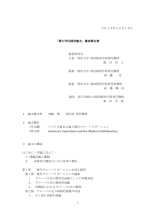- 著者
- 柿崎 繁
- 出版者
- 経済理論学会
- 雑誌
- 季刊経済理論 (ISSN:18825184)
- 巻号頁・発行日
- vol.50, no.2, pp.6-18, 2013-07-20 (Released:2017-04-25)
This paper discusses the rise and fall of the U. S. hegemony in relation to modern globalization. The struggling system of the cold war era ended in 1989-1991. The capitalism system in which the United States is the axis has also strengthened the nuclear and missile systems in the cold war era. The military inflation in the U. S was advancing and went sapping the foundations of the U. S. hegemony. That is, the competitiveness of the U. S. manufacturings was declining and the hollowing of the manufacturings in the U. S. was accelerated. There were big changes in the industrial structures in the U. S, which mean the financial and information services industries took the manufacturings'place and came to forefront. The U. S. also promoted to ease the regulations of the rest of the world to realize the growth of the U. S. financial and information services industries globally and strengthen the foundations of the U. S. financial capitalism's hegemony in the world. The world seemed to be stabilized by globalization under the U. S. hegemony, but the world became even more chaotic than before the Post-cold war era. The United States financed the funds from the world to make the U. S. hegemony stronger. But, it caused the asset bubbles and the excessive consumption in the U. S. The excessive consumption in the U. S made it possible for the world economy to export to U. S and grow. However, the financial crisis happened in 2008. Its aftermath is still followed in Europe. The chains of growth has been replaced by the chains of crisis. The competition for sharing the profit by the wealthy classes of the world has shifted the competition to impute the losses to the others. The gap between the rich and the poor has expanded tremendously. These have weakened the U. S. hegemony. So the United States are not forced to seek the cooperation of the G20. In these situations China has been on the rise. I think these will be the beginning of the decline of the U. S. hegemony and global liquidation of the cold war debt in the world.
